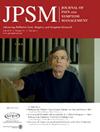缓和故事交换:叙事医学与人文科学
IF 3.2
2区 医学
Q2 CLINICAL NEUROLOGY
引用次数: 0
摘要
Outcomes1。认识到讲故事和叙事干预如何在姑息治疗专业人员中促进意义创造和培养可持续性。参加一个现场的,面对面的讲故事活动,关注真实的脆弱,深入倾听,以及跨专业的联系。摘要姑息治疗(PC)面临劳动力危机。重病患者超过PC临床医生的供应,在他们的工作中,临床医生面临着反复的损失和极端的痛苦,这可能导致倦怠和消耗。我们迫切需要干预措施,在这种情绪复杂的环境中培育繁荣的社区。讲故事是一条很有前途的道路。为了应对PC临床医生中普遍存在的孤独和道德困扰,我们创建了“缓和故事交流”(PSE),这是一种讲故事的干预,旨在建立社区,减少隔离,并帮助临床医生重新发现他们工作中的共同意义。方法/方法与会者将参加姑息疗法故事交流。在这个环节中,志愿者讲故事的人将分享他们在工作或家庭中“坚持”的个人故事。在每个故事之后,引导者将与小组进行互动反思。迄今为止,来自10个不同国家实践地点的84名跨专业参与者完成了项目评估调查。反应表明,参加PSE后,参与者对他们的工作和更大的姑息治疗社区的联系有所增加。此外,超过一半的自由文本回复包括“有意义”、“治愈”、“强大”和“普遍”等术语来描述他们的参与。PSE建立在叙事医学和保健工作者健康倡议的基础上,通过讲故事、利用反思的社区共同创造和共享意义创造的新颖组合。最初的调查数据表明,参加PSE后,参与者感到工作的意义增加了,他们自己的故事的重要性增加了,与PC社区的联系也增加了。参考文献rutchas A, Rusch R, Leiter R.缓和故事交换:一种创新的讲故事干预,以建立社区,促进共享意义和提高可持续性。姑息治疗和支持性治疗。在出版社。本文章由计算机程序翻译,如有差异,请以英文原文为准。
Palliative Story Exchange: Narrative Medicine and the Humanities
Outcomes
1. Recognize how storytelling and narrative interventions foster meaning making and cultivate sustainability among palliative care professionals.
2. Participate in a live, in-person storytelling event focusing on authentic vulnerability, deep listening, and interprofessional connection.
Abstract
Palliative care (PC) faces a workforce crisis. Seriously ill patients surpass the supply of PC clinicians, and in their work, clinicians face repeated loss and extreme suffering which can lead to burnout and attrition. We urgently need interventions that foster thriving communities in this emotionally complex environment. Storytelling represents a promising path forward. In response to widespread loneliness and moral distress among PC clinicians, we created The Palliative Story Exchange (PSE), a storytelling intervention to build community, decrease isolation, and help clinicians rediscover the shared meaning in their work.
Methods/approach
Attendees will participate in a Palliative Story Exchange. In this session, volunteer storytellers will share personal stories about moments that they “are holding onto,” either from work or from at home. After each story, the facilitators will lead an interactive reflection with the group.
Results
To date, 84 interprofessional participants from practice locations across 10 different countries have completed a program evaluation survey. Responses demonstrate an increase in the connection that participants felt towards their work and the larger palliative care community after attending a PSE. Further, more than half of all free-text responses include terms such as, “meaningful,” “healing,” “powerful,” and “universal,” to describe their participation.
Conclusions
The PSE builds upon narrative medicine and healthcare worker wellness initiatives through a novel combination of storytelling, community co-creation using reflection, and shared meaning making. Initial survey data demonstrates that after attending a PSE, participants feel increased meaning in their work, in the significance of their own stories, and connection with the PC community.
Reference
Drutchas A, Rusch R, and Leiter R. The Palliative Story Exchange: An innovative storytelling intervention to build community, foster shared meaning, and improve sustainability. Palliative and Supportive Care. In press.
求助全文
通过发布文献求助,成功后即可免费获取论文全文。
去求助
来源期刊
CiteScore
8.90
自引率
6.40%
发文量
821
审稿时长
26 days
期刊介绍:
The Journal of Pain and Symptom Management is an internationally respected, peer-reviewed journal and serves an interdisciplinary audience of professionals by providing a forum for the publication of the latest clinical research and best practices related to the relief of illness burden among patients afflicted with serious or life-threatening illness.

 求助内容:
求助内容: 应助结果提醒方式:
应助结果提醒方式:


